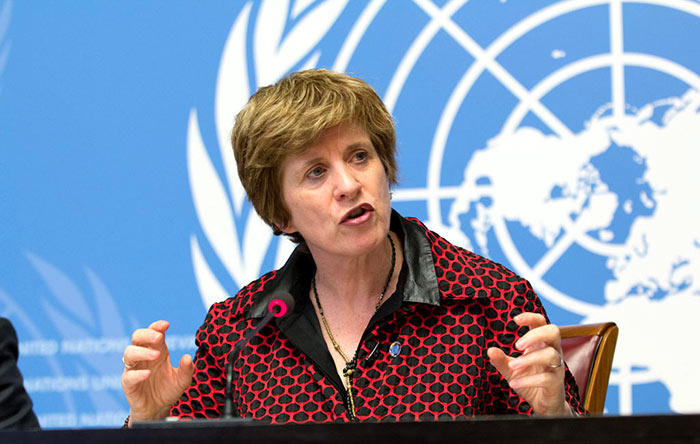Regret slow progress in transitional justice mechanisms in Sri Lanka

The Office of the High Commissioner for Human Rights (OHCHR) yesterday told the UNHRC that it much regrets to learn of the slow progress in establishing transitional justice mechanisms in Sri Lanka.
Speaking at the 37th session of the Human Rights Council, Kate Gilmore, the United Nations Deputy High Commissioner for Human Rights however welcomed the Government’s constructive engagement with the OHCHR and the human rights mechanisms, including its cooperation with visits of this Council’s Special Rapporteurs on human rights and terrorism; on truth, justice, reparation and guarantees of non-recurrence; and the Working Group on Arbitrary Detention. It said that in the absence of concrete results or publicly available drafts of legislation, it seems doubtful that the transitional justice agenda committed to by the Government under this Council’s resolution 30/1 could be fully implemented before our next report in March 2019.
She also said that the HR commission was seriously concerned about multiple incidents of inter-communal violence, attacks and hate speech against minorities observed last year – a worry further exacerbated by recent developments that have occurred since the drafting of the report, including violence against Muslims in the Kandy district that led to the proclamation of a state of emergency for 12 days.
Allegations of continuing use of torture and reports of harassment or surveillance of human rights defenders are more than worrying.
In light of the gravity of the above matters and given the important role that this Council has played to date, the High Commissioner strongly advises that this Council continue to focus its attention on the human rights of the people of Sri Lanka and in particular on the processes in place for accountability and reconciliation, the statement added.
(Source: Daily Mirror)
Latest Headlines in Sri Lanka
- Sri Lanka to launch national review on social media’s impact on children January 30, 2026
- Sri Lanka, Saudi Arabia move to boost industrial cooperation January 30, 2026
- Johnston Fernando, two sons and others further remanded until February 13, 2026 January 30, 2026
- Sri Lanka raises daily wage of plantation workers to Rs. 1,750 January 30, 2026
- Sri Lanka expands Internal Affairs Units to 250 more state institutions January 30, 2026


